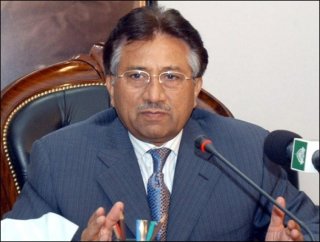Musharraf losing grip after chief's killing

ANALYSIS
Bronwen Maddox
September 01, 2006
THE uprising in Pakistan's southwest following the army's killing of fugitive tribal leader Nawab Akbar Bugti at the weekend could be the beginning of the end for President Pervez Musharraf.
Not that he has had a smooth ride in the seven years since he seized power in a military coup.
But many forces have suddenly come together to try to dislodge him.
His attempt at using the army to crack down may make matters worse - and, for the first time, he may not have army support.
Pakistan has long combined an intimacy with the West with an immutable separateness of its own intricate culture and politics.
That has been particularly true of Musharraf's regime; he has tried to weave together his role as a US ally with courtship of religious parties at home. But his plan is unravelling.
The crisis this week has come from Baluchistan, the wild southwestern province that contains valuable gas reserves. The highways linking Quetta, the provincial capital, to Karachi and to Iran have been paralysed since Saturday by riots, after the army killed tribal chief Bugti. Pakistani soldiers searching a cave found his body yesterday but said it was pinned under a boulder and would take days to retrieve.
The blockades in response to the killing forced many businesses to close. The Baluchis, fiercely independent, have had a grievance for years that they are being "Red Indianised" - their land and resources usurped by newcomers while they watch and withdraw. That has sharpened as gas prices have soared and land along the spectacular coast is developed.
Musharraf's chosen tactic of sending in the army to crush revolt has appeared to inflame sentiment, particularly as army officials take land for their needs. Critics say he would have done far better to accept their moderate demands for a better share of gas revenues.
The Baluchi revolt is dangerous to him because it is bigger and better organised than before, and because its leaders are finding common cause with other opponents of Musharraf.
The army is badly demoralised by the long, wearing campaign against the Taliban in the tribal lands of Waziristan, on the Afghan border. The action came after demands by the US for Pakistan to help more on the border, but it has strained Musharraf's command of the army as nothing before.
The demand Britain would most like to make of Musharraf is for him to curb religious militants in Quetta, but it is unclear that he could.
This year, retired generals and former supreme court judges wrote to him openly calling on him to stand down as head of the army. Meanwhile, although financiers are impressed with Pakistan's recent growth of 6 per cent a year, poorer Pakistanis are aggrieved at inflation of about 9 per cent.
The religious parties, whom Musharraf has found helpful, have now joined the main parties in trying to stop him gluing himself to the presidency beyond next year, when the constitution says he must step down.
This week, Shaukat Aziz, his Prime Minister, survived a no-confidence vote. But the joint action by Musharraf's formerly divided critics is a far more serious threat than he has yet faced.
The Times
Link Here




2 Comments:
Well, and so? What do you think will happen/should happen?
Hey Snobar,
How about another illegal war and occupation to take this dictator out, and then one of Georgies oh so now famous Democratic Elections.
Ohhhhhh I forget he's Georgies buddy isn't he, another puppet, to be used and thrown away, when his use to Georgie and his Regime are of no benefit anymore.
Post a Comment
<< Home